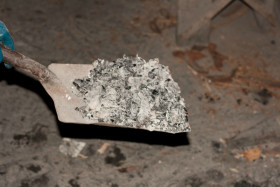Proper ash disposal
If you have a woodstove or wood-burning fireplace, you know that it comes with the regular chore of removing ashes. One cord of firewood produces 50 pounds of ash, and the average home utilizing wood as a heat source burns three cords of wood each year. That’s a lot of ash to clear out of your fireplace and dispose of properly!
While it seems simple, clearing ash from you fireplace does involve some risk. Improper ash disposal can lead to burns, a home fire or carbon monoxide poisoning.
We’ve put together our steps for successful ash removal.
- Don’t remove all the ash. You shouldn’t remove ashes from the fireplace each time you build a fire. While too much ash can lead to corrosion in your firebox or inhibit your ability to build a fire, an inch bed of ash at the bottom of your fireplace helps insulate your fire and helps your fire burn more efficiently.
- Leave ashes in the fireplace for at least 24 hours after a fire before you attempt to remove them. Otherwise, you risk removing smolder embers, which can lead to a fire or carbon monoxide emission in your home.
- Treat ashes like they’re still hot. Always assume that the ashes in your fireplace are hot, as smoldering embers can lurk at the bottom of your fireplace for some time. Wear protective gloves, and use a metal shovel to remove the ash.
- Leave burning embers in the fireplace. If you do notice embers that are still burning or smoking, push them to the back of your fireplace and leave them there, surrounded by a bed of ashes. Don’t try to remove them with the rest of your ashes.
- Place ashes in a metal bucket. Once you have cleared your ashes, place the bucket away from combustibles in a well ventilated area, in case it is still burning. If the ashes are smoking, they will release carbon monoxide that can build up to dangerous levels in an unventilated room.
Once your ashes have been removed from your bucket and left to cool for some time, you can bag them and place them with the rest of your trash, but you may want to consider saving them, as there are several good uses for fireplaces ashes. If you’re a gardener, the ashes can be sprinkled on and turned over into your soil, or they can be placed with the rest of your compost. Ash also can be sprinkled around plants to keep away slugs and snails. Ashes also can be used to melt ice, remove pavement stains and control algae in ponds. A wet sponge dipped in ash makes a great scrubber for glass fireplace doors, and a paste of ash and water can be used to polish silver.
If you have any questions about proper ash disposal, don’t be afraid to call the experts at Your Chimney Sweep. We consider it part of our job to educate our customers about fireplace operation and safety.

